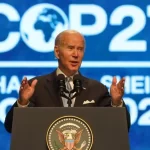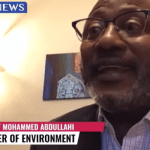Nigeria is an important part of the African and World Community and must always be present at the table when issues concerning climate change is in play as these also determine the Technology and the Economy to adopt.
The Chief Executive officer of Puttru Technologies, Monica Madueke, disclosed this while speaking on the recently signed white paper on Climate change which includes adaptation and mitigation techniques which were also adopted by Other African Countries.
She added that whenever issues of Climate change are on the agenda the developing countries should also be at the table to ensure they are not left behind.
She says the signing of the White Paper shows the seriousness attached to the issue by the Federal Government and Stakeholders in the private sector.
According to her Nigeria and the African continent should focus more on adaptation techniques in trying to find a solution to the issue of climate change on the African Continent.
She spoke to TVC News’s Ibrahim Shitta on the World at 3pm.
Read More Below….
“The reason why we decided to come up with this initiative was really to put forward Nigeria’s interest. A lot of times these global conversations focus on the big economies, the largest economy, largest economies, and they seem to be the EU, the US. And other very large economies.
And they put forward strategies, they put forward targets, they put forward priorities that may not really reflect on other economies like Nigeria and northern African economies. So what we needed to do was to work together, as you said, was a collaborative effort whereby you have people from the private sector, the academia, the civil society organizations, government institutions coming together to really look at what the situation was in Nigeria and how to make sure that we can come together, put forward a message whereby, when priorities for global climate change are discussed, we also have a reflection of what is important to Nigeria and Africa as a whole.
The reason why Nigeria seems to focus on adaptation, even though even at the African union level, or the African development level, or even the ecosystem, adaptation finance is given priority, it’s because most times you see those who are interested in investing in climate related projects go for mitigation.
They want to see renewable energy projects, they want to see us cutting down CO2 emissions, whereas what Nigeria and other African countries should be doing is focusing on reducing deforestation, focusing on adaptation projects.
So it’s really about positioning ourselves in a way that we can speak clearly on what our unique circumstances are and to negotiate strongly on what is important to us. And this is what the white paper aims to do.
It really goes into the facts of what the situation is today and to bring out key points on how those negotiating on our behalf can speak clearly with data and statistics on what Nigeria should be doing on climate change. Some European countries are said to have backtracked on their climate pledges in favor of more coal power plans.
They have been kind of scrambling to ensure their energy needs are met during the coldest time of the year. So shouldn’t we ensure that we are stable in terms of energy generation before we can boldly begin to talk about switching to low carbon world very quickly?
This is what we’ve always stood for, last year when they were talking about the energy transition and how African countries should stop contracting on oil and gas and developing their resources, which should permit to say that this does not make any sense.
Because if you look back at the electricity market in Europe, you see that when it comes to choice of technologies, economics always seems to be at play. And this is really what the economic situation today is showing us.
That really, when it comes to economics, energy security, sufficiency and independence seems to weigh very strongly on how countries choose their energy technologies. So even if you look at the ecosystem level or the AU level, African countries are speaking clearly on how they must focus on energy security and how we must mobilize our non-renewable and renewable energy resources.
We must be ambitious, but also practical. And I think it’s very clear that Nigeria has this position. Sir, I can see these are topics they’re very much passionate about. I can assure you that it’s an ongoing conversation, and we look forward to having you more to talk about”.













